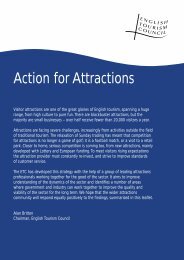Spa Business issue 2 2012 - Leisure Opportunities
Spa Business issue 2 2012 - Leisure Opportunities
Spa Business issue 2 2012 - Leisure Opportunities
Create successful ePaper yourself
Turn your PDF publications into a flip-book with our unique Google optimized e-Paper software.
Ellis (front) was a fi tness instructor at Golden<br />
Door in the 70s and feels her long career in<br />
spas greatly helps with predicting trends<br />
in the business – especially in the annual<br />
trends report. “We do three studies a year at<br />
<strong>Spa</strong>Finder, one with consumers, one with the<br />
industry and one with travel agents, which<br />
gives us a lot of information,” she says. “We<br />
can also see from our website what’s trending.<br />
Finally, we have a team who travel to<br />
spas all over the world, and I count on their<br />
input. Personally, I always keep a notebook<br />
on me to jot down trends to track.”<br />
What sets <strong>Spa</strong>Finder’s report apart from<br />
others is the focus on emerging trends –<br />
such as wellness gaming on the 2011 list<br />
(see p80) – rather than established ones. “To<br />
make those sorts of predictions, you have to<br />
do a fair amount of research,” she says “and<br />
that means reading a wide variety of newspapers<br />
and publications, going to [non-spa]<br />
conferences like TED and TEDMED, and<br />
talking to many people around the world<br />
about what’s going on.”<br />
As a result of such intense interest, the<br />
list is no longer only identifying emerging<br />
trends – it’s also driving them. Ellis says: “I<br />
noticed maybe four or fi ve years ago that<br />
shining a light on an emerging trend would<br />
Like <strong>Spa</strong>Finder,<br />
California’s Golden<br />
Door has faced<br />
plagiarism – an<br />
industry-wide <strong>issue</strong><br />
that needs addressing<br />
“I noticed that shining a light on an emerging trend<br />
would accelerate it... so now if I think a trend will<br />
have a negative industry impact I won’t include it”<br />
oft entimes accelerate that trend. So now one<br />
of the things I consider is what’s good for the<br />
industry… and if I think a trend will have a<br />
negative impact, I won’t include it.”<br />
Another reason a trend might not make<br />
the cut is that it’s too early in its evolution.<br />
“One that didn’t make it this year is the<br />
trend for spas to make their facilities and<br />
programmes available to the disabled,” she<br />
says. “It’s a small niche, but it’s increasing<br />
and it really dovetails into one of our trends<br />
from last year, which was pain relief for the<br />
ageing, so we’re watching that.”<br />
A third consideration, says Ellis, is making<br />
sure they’re consumer-friendly. “Th at happened<br />
this year with employee wellness [the<br />
trend for corporate wellness programmes],”<br />
she says. “Th at’s a very interesting opportunity<br />
for the industry, but we didn’t feel consumers<br />
could relate to it yet; it’s too soon. So we put<br />
it in at number 11 as a bonus trend.”<br />
An ethical challenge<br />
Th e popular success of the <strong>Spa</strong>Finder <strong>Spa</strong><br />
Trend Report has inevitably led to it being<br />
widely quoted in both the consumer and<br />
industry press, as well as referenced by other<br />
experts. Yet while this kind of publicity is<br />
good for both <strong>Spa</strong>Finder and the industry,<br />
there is also a downside to the report’s ubiquity.<br />
“A few years ago, we started seeing other<br />
people in the industry putting together their<br />
own trends lists,” says Ellis. “And we noticed<br />
that many of these lists were basically our<br />
list. It would maybe have a slightly diff erent<br />
name or a slightly diff erent order, a little bit<br />
of cosmetic work to make it look new. But<br />
it really wasn’t new.<br />
“Th ere’s a lot of work involved in compiling<br />
our trends report, so a couple of years<br />
ago we decided we had to step up and start<br />
protecting our copyright. Since then, our<br />
lawyers have sent out a fair number of letters<br />
to people [trying to pass off the trends<br />
we identifi ed as their own].”<br />
Plagiarism is not a problem unique to<br />
<strong>Spa</strong>Finder, however. According to Ellis, it<br />
is an industry-wide <strong>issue</strong>, with numerous<br />
spa operators, consultants and suppliers<br />
apparently believing that the creative work<br />
of others is theirs for the taking. As an example,<br />
she cites the case of the Golden Door<br />
SPA BUSINESS 2 <strong>2012</strong> © Cybertrek <strong>2012</strong> Read <strong>Spa</strong> <strong>Business</strong> online spabusiness.com / digital 53

















